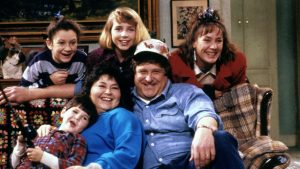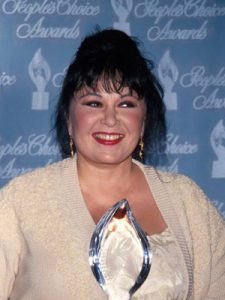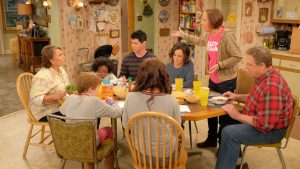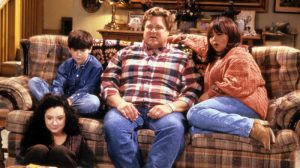Late last year, when it was confirmed that Roseanne, the iconic ‘90s sitcom that broke down walls during its nine-season run on ABC, would be returning to the network for a new season (the latest in a series of major network revivals of previously successful series), I was not excited. You would think I would have been excited; the early seasons of the original Roseanne are some of my favorite television of all-time. My family knows this, and a lot of them were puzzled when I didn’t immediately express excitement over its return over two decades later. That’s because I really wasn’t excited. I was scared.

- The cast of Roseanne in 1988.
To say that the original Roseanne, which ran from 1988 to 1997, broke new ground would be a vast understatement. It portrayed Middle America in a way that everyone knew to be true—but had never been shown on network television in such a way. In a sense, American network TV was still recovering from ‘50s and ‘60s family ethics on shows like The Brady Bunch, Happy Days, Laverne & Shirley and even Three’s Company. We had All in the Family and The Mary Tyler Moore Show in the ‘70s, which started unraveling the perfect illusion of the American family unit and showing the reality that not everything is okay by the final commercial break—but accepting such realities was a different story altogether. Representation or no representation, we don’t always watch TV for reality, right? We watch it, arguably, to escape.
At the height of its run, the original Roseanne had it all. It had punch lines—good ones—and it had nerve. It steered straight into controversial issues—poverty, labor unions, domestic violence, premarital sex, racism, sexuality—but didn’t sensationalize them. One of my personal favorites was an episode that found youngest child DJ (Michael Fishman) having to kiss a girl in a school play but was made uncomfortable by the fact that she was black. In the episode’s best scene, Roseanne lays into him about tolerance, shouting: “Black people are just like us, they’re every bit as good as us, and any people who don’t think so are just a bunch of banjo-picking, cousin-dating embarrassments to respectable white trash like us!” It managed to be unsentimental by portraying that, sometimes, families will always love each other, but that doesn’t mean we like each other right now (I mean, let’s call a spade a spade: the Conner family hated each other most of the time), but also managed to still somehow be deeply felt. Because it was real. They were loud. They were fat. They belched and bellowed, and fought over the TV remote. They lived paycheck to paycheck. They were real. For the majority of its run, Roseanne could have been summed up merely by the title of its pilot episode: “Life and Stuff.”
In the two decades since the original series went off the air, Roseanne got itself a reputation as one of the only network television comedies that “got” Middle America, but that reputation is only somewhat justified, since several other network TV series (both comedy and drama) have since continued what Roseanne started in the ‘90s: Grace Under Fire, Malcolm in the Middle, Friday Night Lights, The New Adventures of Old Christine and The Middle, to name a few, not to mention sitcoms that began the conversation that Roseanne continued: Maude, All in the Family, Good Times and Married... with Children. Roseanne covered it all somehow both crudely and tastefully at the same time, without excessive amounts of melodrama. It stood out with good reason: it was real, it was funny, it was created by and was mainly about a woman, and would go on to become the number one American television program. Not to mention the fact that the real Roseanne would become a central figure in pop culture as quite possibly the most iconic unruly woman—she wrestled creative control of Roseanne away from other male producers for most of the series’ run, believing that the material they produced was taking away from the series’ feminist and women-centric tone, and pulled outrageous stunts on Hollywood red carpets, all of which only amplified her unruly image.
“I knew they would try to homogenize the character I created. The question was how much. I wasn’t prepared for the answer. It was hard for me to give ideas that weren’t executed the way I wanted. That drove me crazy.”
—Roseanne Barr
But one could say that this unruly image that Roseanne Barr stepped into at the height of her hit sitcom got away from her—once she had worked her way up and, by the later seasons of the series, was in near complete creative control, Roseanne took a strange turn. The show was always—for lack of a better term—“white trash” in a sense, but it seemed to become more apparent and amplified as time wore on. And there was nothing wrong with that...at first. It continued to provide representation “for” Middle America through American comedy TV. But before long, it just got...weird. Episodes were all over the place; strange musical numbers, surreal dream sequences, Roseanne fighting terrorists on a plane and, by the final season, the Conners had won the lottery: perhaps the solid moment where the weirdness had taken its toll. Suddenly America’s most iconic working-class family was no longer working-class: the entire premise was shot to hell, and critics took notice. To top it off, it turned out the entire final season was in fact a dream thought up by Roseanne to help herself cope after Dan’s (John Goodman) death, who had died following a heart attack at the end of the eighth season.

- Roseanne Barr in the 1990s.
And the thing was, the network allowed the weirdness to continue longer than it would have on any other show, established or not. I always believed that Barr became drunk with power and decided that, by a certain point in the series’ run, that they were just going to do whatever the hell they wanted and everyone would just have to like it. But at the same time, it wasn’t completely out of touch of the show’s realm: Roseanne Conner’s brazenness, clear obesity and questioning the grey area between feminism and the family ideal was just one of many things that made the character—and Roseanne—compelling. Barr captured it best herself: “Shows are dominated by fathers who know best and wives who are so enchanted with everything they do. I wanted to be the first mom ever to be a mom on TV. I wanted to send a message about mothers and how much we do.” But, as writer and senior culture critic for BuzzFeed Anne Helen Petersen points out in her review of the revived Roseanne, “Being unruly is not necessarily, or consistently, aligned with being ‘progressive.’ Those who making a living pushing other people’s boundaries often, with time, seek new boundaries to push. Barr was rewarded for her honesty, but everyone’s honesty needs a certain level of bullshit moderation: not a filter, necessarily, but an ability to reflect, and an understanding that too much power, combined with too little self-censorship, can curdle even the most progressive of worldviews.”
Barr always closely identified herself with Roseanne Conner during the original series and constantly reminded the press that the character was based off of something she created—she identified as a feminist at a time when most female public figures did not, and was always very quick to call bullshit when it came to representation of certain people both on and behind the screen—which is why she sought to introduce gay characters to her sitcom because she had gay siblings in real life, among a slew of other bold creative choices she made and risks she took. But that didn’t mean that Roseanne Barr and Roseanne Conner were ever the same person: Conner was based off of her stand-up routines which was based off of Barr’s life so sure, they shared some of the same world views that they then in turn shared with the world through a television sitcom, but once Barr had worked her way up to the top of the creative ladder, she had pushed so many boundaries that, as Petersen puts so eloquently, she needed new boundaries to push. And maybe she ran out.
The original Roseanne bid adieu after nine mostly good seasons in 1997. Flash-forward nearly 21 years later, when Roseanne has returned to network TV in a time when major networks are finding bankable opportunities in turning to previously successful series for new ratings boosts. So why was I scared when it was confirmed that ABC was bringing back the once groundbreaking show that I still love so much? Well, to say that Roseanne Barr is the same person she was in the mid ‘90s would be a huge lie, and anybody with access to the media knows this. Sure, she was still the funny and bold Roseanne we loved in the ‘90s, but like everyone has done since we last saw the Conner family, she’s aged: not only in years, but in her ideologies as well. Watching reruns of the original Roseanne reminds us of how relevant and groundbreaking it was (and perhaps, in some ways, still is), but that doesn’t mean the same Roseanne with the same wacky yet worthwhile commentary would do the same for the country as it did from 1988 to 1997. I mean, the controversial things Barr said in the ‘90s compared to the controversial things Barr says now are not exactly on the same level of brazenness, shall we say. Apparently, ABC disagreed when they ordered 9 new episodes of the series and, for the first few months, everyone waited in mostly pleasant suspense. We loved the Conners! It’ll be great to see them again and have their social commentary in these trying political times! Meanwhile, I was over in the corner, making a cringey face while silently thinking, “Ummm... you guys remember that a) the show got really, really weird at the end and b) Roseanne Barr is a psycho Trump supporter who openly trolls people online and called Hillary Clinton a witch and a liar (among other more explicit obscenities) on social media during the 2016 election? Aaaaand, we’re going to be supporting this WHY?” My fear for the revived Roseanne only intensified once the cast and crew confirmed that the Conners would be Trump supporters on the series as well—which was when most of the rest of you joined me in the corner making cringing faces and being scared for what was going to happen.

- The Conners putting the D in dysfunctional, 2018 style.
But, of course, I knew I was going to watch the new episodes of Roseanne. How could I not? It is still some of my favorite TV of all-time. I couldn’t not check out its revival, cringey political views inserted or not. But it also drew the question of how much of a platform the network was going to give Barr the second time around—she had worked her way up the first time and no one could tear her down, but could the same have been said for its revival two decades later? The answer was clear: we’ll just have to watch and see. And you know what? Apart from the oddly surreal experience I had seeing the Conner house in high-definition all these years later, the rebooted Roseanne was oddly neutral politics wise, which was both refreshing and somehow relevant. I know critics on the Internet have already pounced on how it’s still normalizing Trump and trying to get us to sympathize with white Trump voters—something people still don’t want to do, for perfectly just reasons—but at the same time, this is the America you are living in (not me, of course; I’m up here in Canada face-palming every time I look at your news), and the series isn’t looking for sympathy for Trump voters: it merely portrayed both sides with the same too-close-to-home punch lines Roseanne always had. One tweet I saw perfectly summed up the first new episode: “Roseanne wasn’t for the left. It wasn’t for the right. It was for real people.” Simple, but true, and in the exact same vein that the series was always in: it’s about real people.

- Sometimes a girl just needs her mama.
Not only was the political angle of the rebooted Roseanne dealt with rather tastefully, another thing was made clear very soon into the first new episode: it seems the revived series is no longer solely a forum for Roseanne Barr’s bold, brazen and unruly ideologies. In fact, the first two episodes make clear that Roseanne Conner is no longer the sole central character of the series, either: Darlene (Sara Gilbert) is wrestling with being an unemployed, single mother of two who has just moved her family into her parents’ house, which in itself is a shift of the original issues Roseanne dealt with in the ‘90s onto her daughter, as the circle of life continues to spin (Darlene’s daughter, Harris, is also a clear redux of who Darlene was as a teenager and that is made clear to viewers almost immediately). These two episodes de-center Roseanne as the hero (or anti-hero) of the family’s story, but she is also there as a heartfelt yet still loud and unruly mother and grandmother. Roseanne Conner’s vulnerability was always there, just beneath the surface of a joke, and now she has passed that onto her future generations: not only her children but her grandchildren, most namely Darlene’s gender-fluid son Mark (Ames McNamara) who Roseanne accompanies to school and playfully threatens the other kids if they give him any trouble, just as only Roseanne can do. But even then—Roseanne has, for the most part, ceased and desisted as the moral epicentre of the series. Darlene, Jackie (Laurie Metcalf) and even the still emotionally immature Becky (Lecy Goranson) have stepped up to have their moments in the sun in that role, which seems to make the revived Roseanne all the more enjoyable. Petersen believes that having Darlene fill the central role that Roseanne served in the original series will be the key to the revival’s success, since Darlene was always the most like Roseanne in terms of dry wit and secret vulnerability.
The one thing that may come to be difficult to reconcile is that we as viewers know how unhinged Roseanne Barr can be in real life as of late, saying unspeakable things both in the press and on social media. Perhaps we’d be more comfortable accepting that the Conners of 2018 voted for Trump because they’re fictional, and we don’t want to face the fact that so many people voted for him in real life. But as far as network television goes, it seems ABC isn’t letting Barr take over the series as a platform for her own ideologies this time—ones that were once admirable, now despicable—and rightfully so: because when Roseanne was a success, it was because it was about real people. And so far, its revival has done an excellent job at both recapturing and updating what made the original so groundbreaking two decades ago.



No comments:
Post a Comment